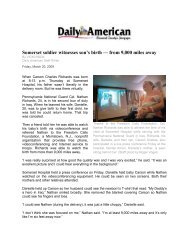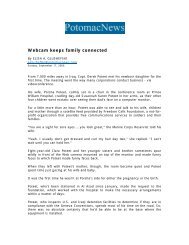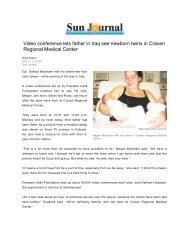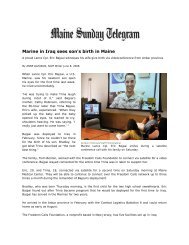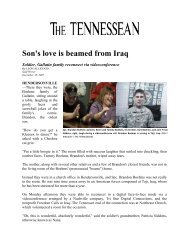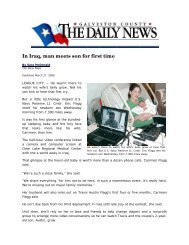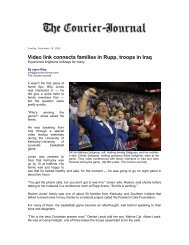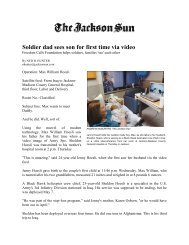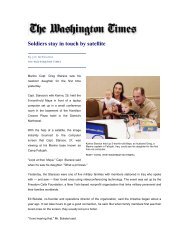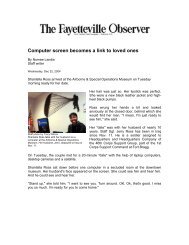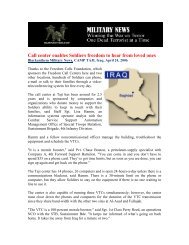Free videoconference provider may shut down - Freedom Calls ...
Free videoconference provider may shut down - Freedom Calls ...
Free videoconference provider may shut down - Freedom Calls ...
You also want an ePaper? Increase the reach of your titles
YUMPU automatically turns print PDFs into web optimized ePapers that Google loves.
<strong>Free</strong> <strong>videoconference</strong> <strong>provider</strong> <strong>may</strong> <strong>shut</strong> <strong>down</strong><br />
By Karen Jowers - Staff writer<br />
Wednesday May 16, 2007<br />
A nonprofit foundation that has been giving about a million minutes of free phone calls a month<br />
to troops in Iraq, and hundreds of thousands of minutes of free Internet access, is running out of<br />
money and is in danger of <strong>shut</strong>ting <strong>down</strong>.<br />
“We’re within 30 days of being blacked out. We’re employing every trick in the book to keep<br />
going,” said John Harlow, founder and executive director of <strong>Free</strong>dom <strong>Calls</strong> Foundation, which<br />
has call centers at camps Taji, Fallujah and Victory, and at Al-Asad Air Base in Iraq.<br />
A number of corporations have been long-time donors of equipment to set up call centers, even<br />
providing videocams for families back home. Since the foundation starting setting up its<br />
locations in Iraq in 2004, over $1 million, mostly in equipment and technology, has been<br />
donated.<br />
Still, Harlow said, “We haven’t been able to get anyone to give us satellite services. It’s<br />
expensive,” said Harlow. Satellite services are costing tens of thousands of dollars each month,<br />
he said.<br />
“We have reasonable prospects for the long term, but in the short-term, our satellite <strong>provider</strong><br />
says we have to pay some bills,” Harlow said.<br />
<strong>Free</strong>dom <strong>Calls</strong> Foundation is spending about $1,000 a day on these services, which allow troops<br />
to keep in touch with friends and family back home. “That averages out to about 50 cents per<br />
military family per month,” he said. An average of about 2,000 families a day are receiving<br />
services in the form of phone calls and <strong>videoconference</strong>s. The foundation serves about 40,000<br />
different families, he estimates.<br />
About 2,000 <strong>videoconference</strong>s are held each month, he said, connecting troops with their schoolage<br />
children, or helping them say their goodbyes to a dying loved one, watch a child graduate, or<br />
witness the birth of a baby. Several troops have even done videoconferencing of ultrasound scans<br />
of their pregnant wives, discovering the gender of their unborn child together.
About 10,000 locations in the U.S. with videoconferencing capability, ranging from schools to<br />
corporations, have opened their doors to families, he said. In some places, like Fayetteville, N.C.,<br />
these sites regularly offer <strong>videoconference</strong>s for families to visit with their deployed troops.<br />
Many companies have donated to help the troops in Iraq, including Logitech, Lenovo (which<br />
bought IBM’s laptop business), Cisco Systems, FedEx, and Broadwave Corp.<br />
But no telecommunications companies, Harlow said. “We sure would like to get donations from<br />
telecommunications companies. They’re making tens of millions of dollars from military<br />
families, and it looks like they could give something back,” he said. “People <strong>may</strong> assume the<br />
government is paying for it. They’re not. It’s all publicly funded.”<br />
Equipment donations are in the works for two more sites — at Camp Taqaddum in Iraq and<br />
Camp Arifjan in Kuwait. But in the short term, everything hinges on paying for the satellite<br />
services.<br />
“We’ve been so focused on the program, we’ve not been out there beating the drums” for<br />
donations, Harlow said. “If a million people could each send us $30, we could have everybody<br />
conferencing in Iraq and Afghanistan.”<br />
“I hear time and time again: ‘I don’t know he’s OK until I see him.’ ”



